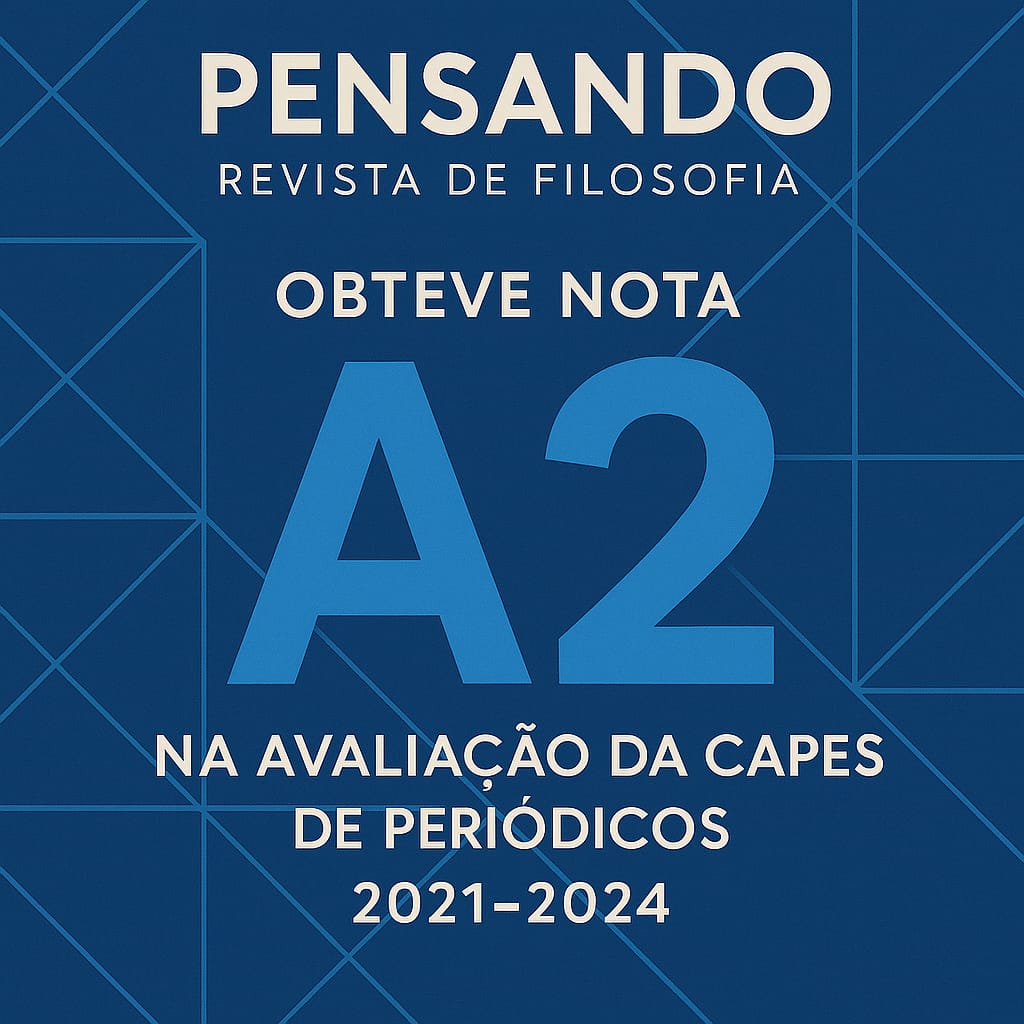Critical Theory and Social Evolution (II)
Development logic, development dynamics and learning processes in Habermas
DOI:
https://doi.org/10.26694/pensando.vol15i36.5774Keywords:
Critical theory, Social evolution, Development logic, Social learning processesAbstract
The present study continues with the analyzes presented in the article “Critical theory and social evolution (I): on the origin and relevance of the concept of social learning in Habermas's work from the 1970s”, discussing in this opportunity how the concept of learning, presented in 1970s, articulates the premises of social evolution inscribed in the Habermasian model of critical theory before the revisions undertaken in the Theory of Communicative Action (1981), clarifying the concepts of development logic and development dynamics, insufficiently described in Problems of legitimation in the late capitalism (1973), based on Habermas's “reckoning” with Marx in the work For the Reconstruction of Historical Materialism (1976). The concepts of development logic and development dynamics articulate (implicitly) assumptions of formal pragmatics and the critique of political economics – even if not centered on the category “work” – to explain why the resolution of steering problems can be understood as “gradient vector” of social learning processes, which justify the heuristic strategy underlying the idea of social evolution. In the 1976 work, Habermas faces the theoretical challenges linked to the proposition of the idea of historical progress, based on the material and symbolic assumptions that structure the “history of the species” presupposed in his theoretical model of social evolution. However, the rationalization of world images and the emergence of new normative structures (and institutions) understood as assumptions of learning processes, which articulate the “driving problems” and the possibility of social evolution, do not satisfactorily resolve the problem of homology between the dimensions of ontogenesis and phylogenesis (ontogenetic fallacy) in the 1976 work. Klaus Eder's criticisms of Habermas will be answered by reviewing the idea (of processes) of (social) learning presented in the 1981 work, based on the contributions of interactionism symbolic of Mead.
References
BANNWART JR., Clodomiro José. Estruturas normativas da teoria da evolução social de Habermas. 2008. 275 f. Tese (Doutorado em Filosofia) – Instituto de Filosofia e Ciências Humanas, Universidade Estadual de Campinas, Campinas, 2008.
BANNWART JR., Clodomiro José. Teoria crítica da sociedade e evolução social. In: NOBRE, Marcos; REPA, Luiz. (Orgs.) Habermas e a reconstrução: sobre a categoria central da teoria crítica habermasiana. Campinas: Papirus, 2012.
COOKE, Maeve. (Ed.) Introduction: HABERMAS, Jürgen. On the pragmatics of communication. Translated by Thomas McCarthy et al. Cambridge: The MIT Press, 1982.
EDER, Klaus. As sociedades aprendem, mas o mundo é difícil mudar. Lua nova, n. 53, p. 5-28, 2001.
EDER, Klaus. Evolutionary theories. In: BRUNKHORST, Hauke; KREIDE, Regina; LAFONT, Cristina. (Eds.) The Habermas handbook. New York: Columbia University Press, 2009.
HABERMAS, Jürgen. On systematically distorted communication. Inquiry: An Interdisciplinary Journal of Philosophy, v. 13, issue 1-4, pp. 205-218, 1970.
HABERMAS, Jürgen. Towards a theory of communicative competence. Inquiry: An Interdisciplinary Journal of Philosophy, v. 13, issue 1-4, pp. 360-375, 1970.
HABERMAS, Jürgen. Towards a Reconstruction of Historical Materialism. Theory and Society, Amsterdam, v. 2, issue 1, p. 287-300, 1975.
HABERMAS, Jürgen. Some distinctions in universal pragmatics: a working paper. Theory and Society, v. 3, issue 2, p. 155-167, 1976.
HABERMAS, Jürgen. Communication and the Evolution of Society. Translated by Thomas McCarthy. Boston: Beacon Press, 1979.
HABERMAS, Jürgen. History and Evolution. Telos, issue 39, p. 5-44, 1979.
HABERMAS, Jürgen. Legitimation Crisis. Translated by Thomas McCarthy. 2. reprint. London: Heinemann Educational Books Ltd, 1980.
HABERMAS, Jürgen. Toward a Rational Society: Student Protest, Science, and Politics. Translated by Jeremy J. Shapiro. 1. reprint. Oxford: Polity Press, 1989.
HABERMAS, Jürgen. Legimationsprobleme im Spätkapitalismus. 13. Aufl. Frankfurt am Main: Suhrkamp, 1994.
HABERMAS, Jürgen. On the Pragmatics of Communication. Cambridge: MIT Press, 1998.
HABERMAS, Jürgen. Agir comunicativo e razão destranscendentalizada. Tradução de Lucia Aragão. Rio de Janeiro: Tempo Brasileiro, 2002.
HABERMAS, Jürgen. Racionalidade e comunicação. Tradução de Paulo Rodrigues. Lisboa: Edições 70, 2002.
HABERMAS, Jürgen. Theorie des kommunikativen Handelns: Handlungsrationalität und gesellschaftliche Rationalisierung. Band 1. 5. Aufl. Frankfurt am Main: Suhrkamp, 2009.
HABERMAS, Jürgen. Theorie des kommunikativen Handelns: Zur Kritik der funktionalistischen Vernunft. Band 2. 5. Aufl. Frankfurt am Main: Suhrkamp, 2009.
¬ HABERMAS, Jürgen. Rekonstruktion des Historischen Materialismus. 6. Aufl. Frankfurt am Main: Suhrkamp, 2012.
HABERMAS, Jürgen. Teoria e Práxis: estudos de filosofia social. Tradução de Rúrion Melo. São Paulo: Unesp, 2013.
HABERMAS, Jürgen. Conhecimento e Interesse. Tradução de Luiz Repa. São Paulo: Unesp, 2014.
HABERMAS, Jürgen. Para a reconstrução do materialismo histórico. Tradução de Rúrion Melo. São Paulo: Unesp, 2016.
OWEN, David S. Between reason and history. Habermas and the idea of progress. Albany: State University of New York Press, 2002.
PETERS, Bernhard. Why is it so hard to change the world? International sociology, v. 9, n. 3, pp. 277-293, 1994.
REPA, Luiz. Jürgen Habermas e o modelo reconstrutivo de teoria crítica. In: NOBRE, Marcos. (Org.) Curso livre de teoria crítica. 3. ed. Campinas: Papirus, 2013.
REPA, Luiz. A transformação da filosofia em Jürgen Habermas: os papéis de reconstrução, interpretação e crítica. São Paulo: Singular; Esfera Pública, 2008.
ROCKMORE, Tom. Habermas on historical materialism. 5. ed. Indianápolis: Indiana University Press, 1993.
SCHMID, Michael. Habermas’s Theory of Social Evolution. In: THOMPSON, John B.; HELD, David. Habermas: critical debates. London: The Macmillan Press, 1982.
STRYDOM, Piet. Collective learning: Habermas’s concessions and their theoretical implications. Philosophy and social criticism, v. 3, n. 3, pp. 265-281, 1987.
STRYDOM, Piet. The ontogenetic fallacy: the immanent critique of Habermas’s developmental logical theory of evolution. Theory, Culture & Society, v. 9, n. 3, pp. 65-93, aug. 1992.
STRYDOM, Piet. Socialcultural evolution or the social evolution of pratical reason? Eder’s critique of Habermas. In: STRYDOM, Piet. New horizons of critical theory: collective learning and triple contingency. New Delhi: Shipra Publications, 2009.
THOMPSON, John B.; HELD, David. (Eds.) Habermas: critical debates. London; Basingstoke: The Macmillan Press Ltd, 1982.
Published
How to Cite
Issue
Section
License
Copyright (c) 2024 PENSANDO - REVISTA DE FILOSOFIA

This work is licensed under a Creative Commons Attribution 4.0 International License.

























